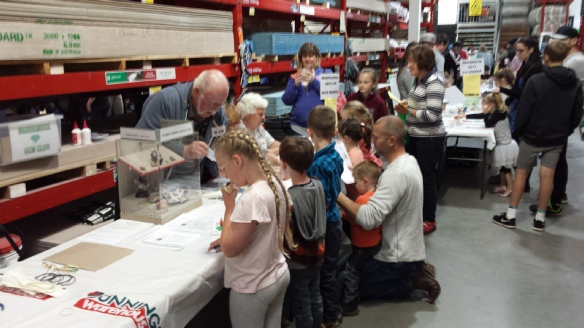
2016 CLUB ACTIVITIES
JANUARY: The club’s efforts during January were focused on our biennial gem show which was held on the 8th and 9th of January. The show was once again a great opportunity for the club to promote the hobby amongst the public. For a full report on the show, go to Page: 2016 & EARLIER GEM SHOWS
FEBRUARY: The club resumed workshop activities. The new silversmithing room and glass fusing area are coming ‘to life’ with a lot of interest from members. Diane and Kay have both been producing some great examples with the microwave kilns!
MARCH: Club members visited the Gemkhana at Geelong. It was a good show with some great displays and some good buy’s were found by club members in the tailgating area. Diane topped up her faceting ‘rough’ supplies and other members purchased cabbing and tumbling supplies. The weather was fine & sunny.
On Sunday 27th club members manned the BBQ at Bunnings as a fund raiser for the club. Special thanks must go to Kay Keen, the club’s treasurer who did much of the organisation and helped man the BBQ during the day. The club did well out of the day and the funds will help pay for the club’s running costs.
L to R: Bunnings staff member, Janice, Diane, Steve, Diana
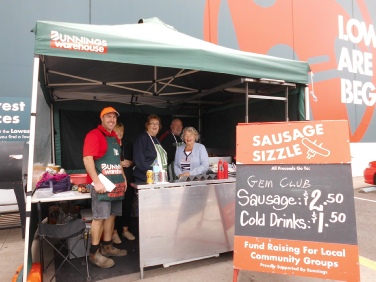
APRIL: Following a lot of demand from club members to do silversmithing, the relevant area has been increased. This will enable Anthony, who has agreed to take on the teaching of members, to tutor additional members in the enlarged area. The glass fusing area had been relocated and we hope this will improve facilities for all members.
24th. Three club members joined a dozen members of the Horsham club for a fossicking trip to ‘Morrisons’, located between Geelong and Ballarat. The weather was great and the Horsham members were a great bunch to fossick with. It took a little time to locate what we believed to be the correct fossicking area. Morrison’s is a popular area and there were plenty of campers in the area including bushwalkers, trail bike riders and gold panners.
The first significant find was a large snake! They tend to come with warm weather, water and lots of vegetation. Members kept a good lookout after that. There were some finds and two cabs I cut are shown below. The chert does take a good polish!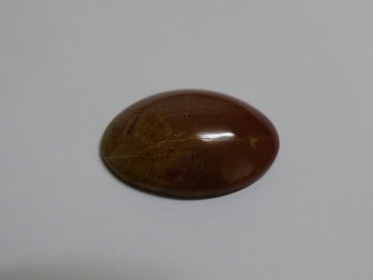
Above:Fossicking in dry creek bed.
Below: Kay Keen ‘speccing’ for chert.
Below: Lunch break at Morrisons!
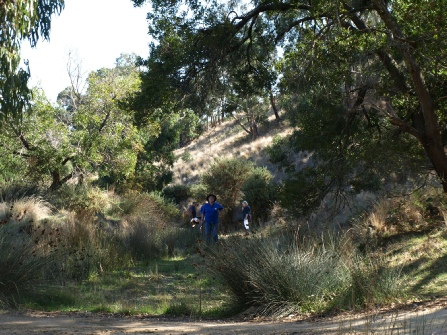
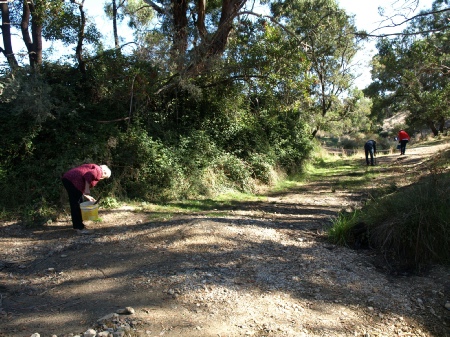
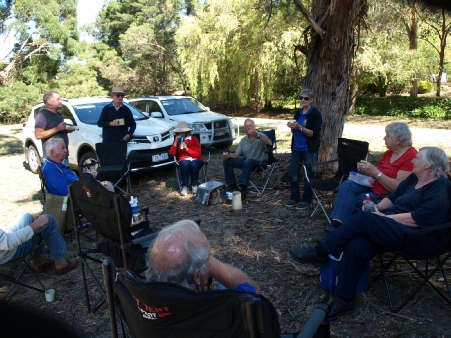
May: Members have been using the silversmithing and glass fusing facilities since they opened. Some of Diane’s glass fusing work is shown in the photos below. A new area of activities for several of our members.
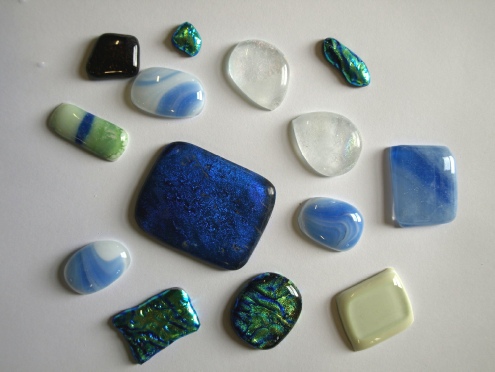
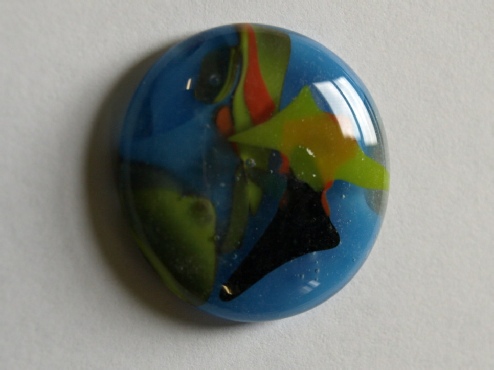
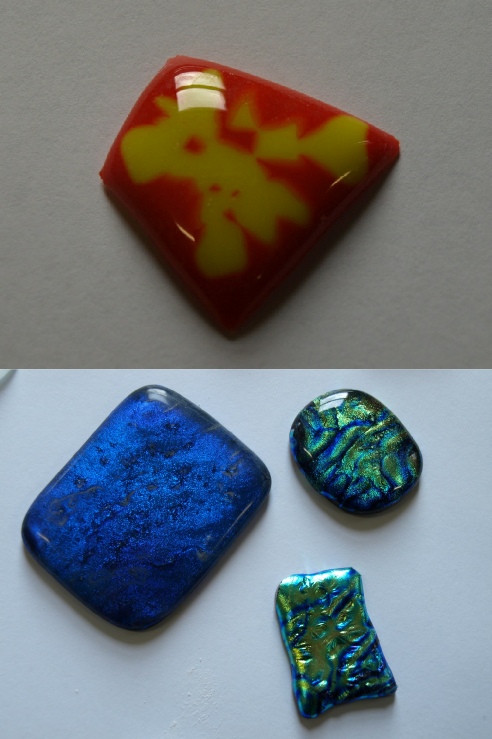
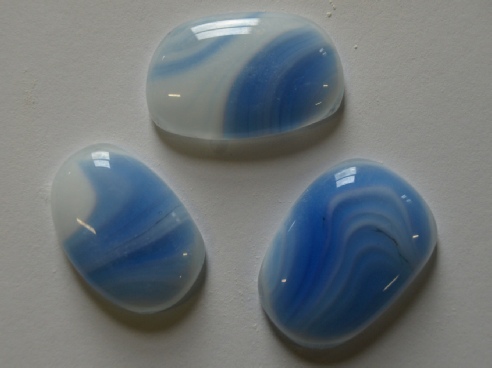
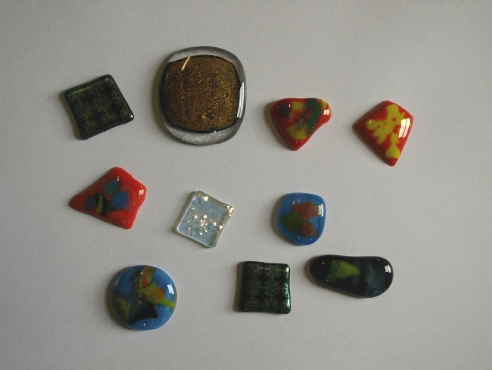
Another club member who has been busy doing the glass fusing is Kay Keen, our club treasurer. Some of Kay’s work is shown below.
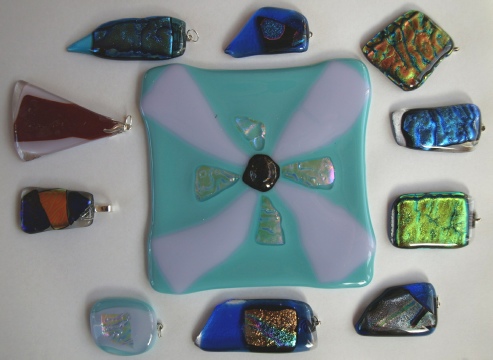
Club members are continuing to make good use of the club workshop as we head into winter. As well as the glass fusing and silversmithing, the faceting and cabbing equipment is being used by members to produce some nice work.
Therese fully focused on her faceting!
Club members in the cabbing area.
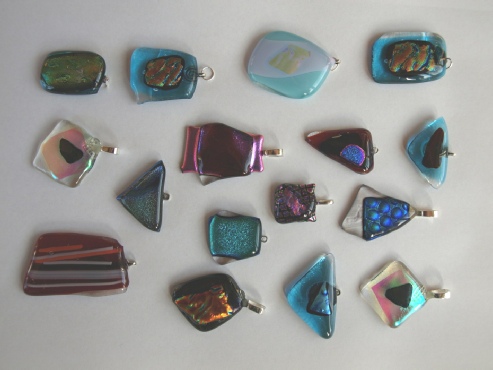
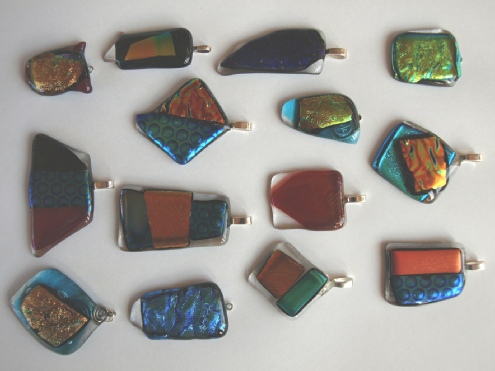
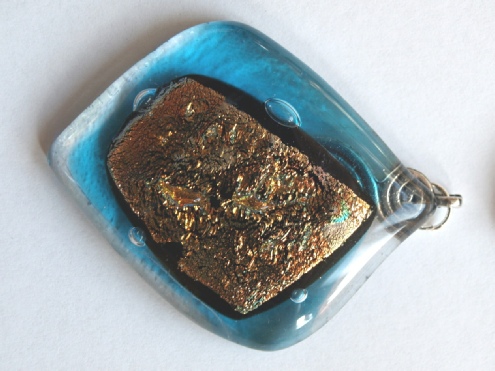
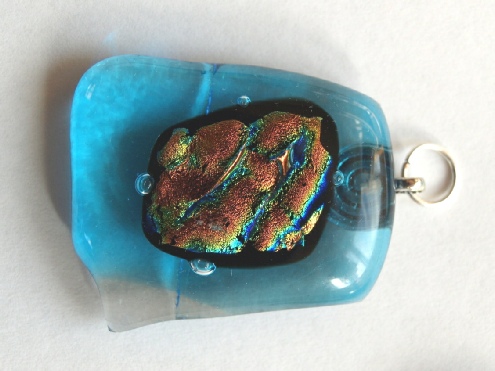
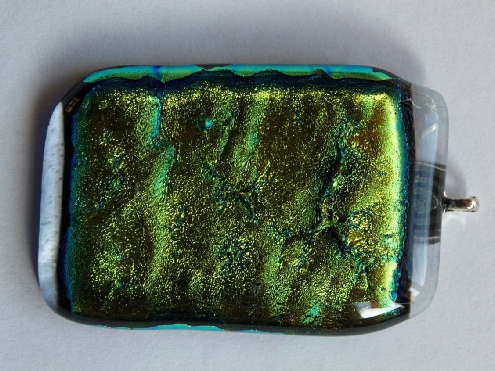
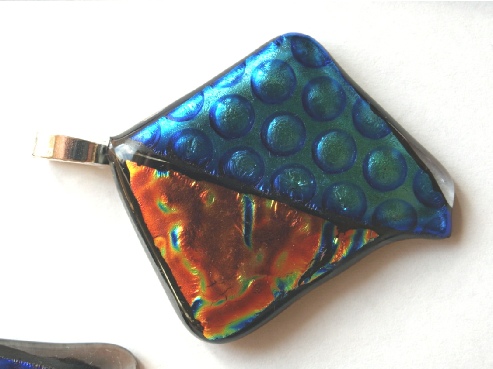
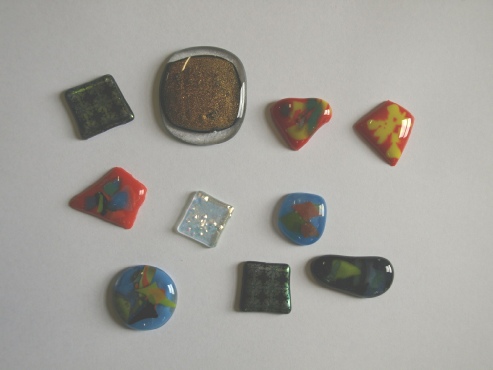
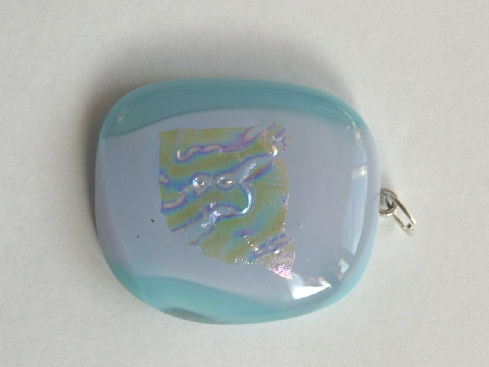
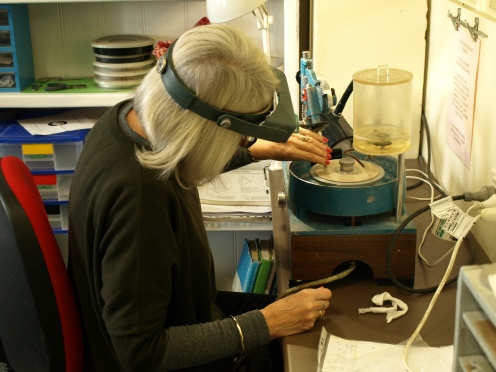
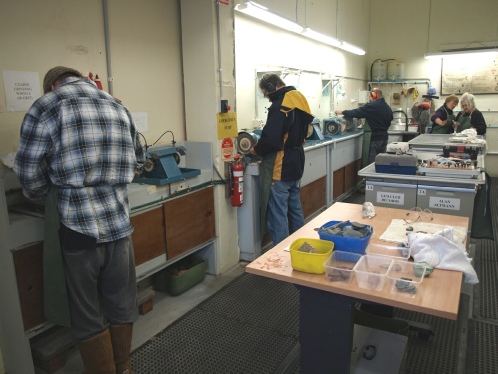
June: Club members have been making full use of the silversmithing area since it was opened. One example of the lovely pendant is shown below. The setting being produced by Helen.
A closer view of the topaz and finding is shown below!
5/6/16 Three club members, Alan A., Kay K. and Diane W., travelled up to the Horsham gem show. The show was held in the club’s rooms located at 24 Roberts Av. in the centre of Horsham. The club’s rooms are in the ‘old police station’, adjacent to the current police station. A very secure location!!
As always the club’s members are very welcoming and friendly, a great group of lapidaries. They make excellent use of the space they have with cabbing, silversmithing, faceting and display areas.
The photos below will give you a flavour of the show and clubrooms.
Doug demonstrating faceting at the show.
Above and left: a
selection of the display
cases at the show!
Part of the show.
Part of the club’s permanent display above & below.
Above: part of the silversmithing room.
The Horsham club’s rooms.
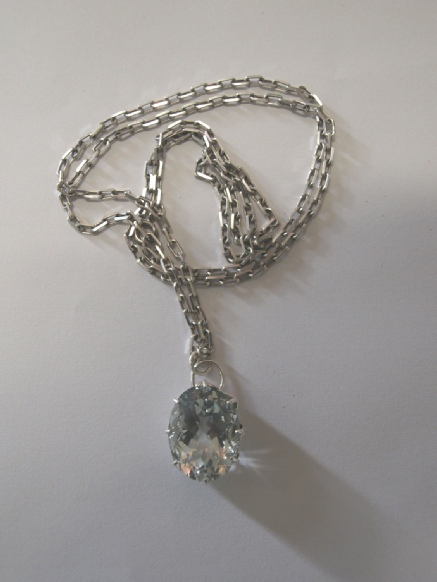
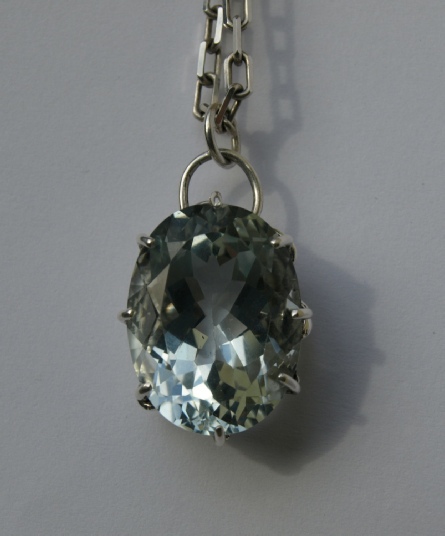
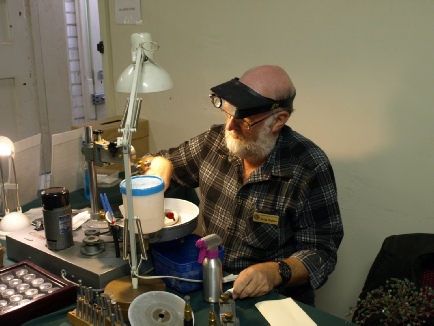
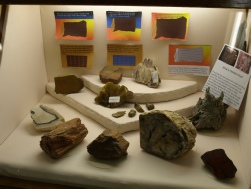
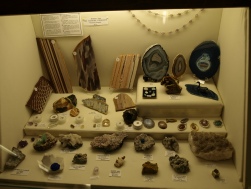
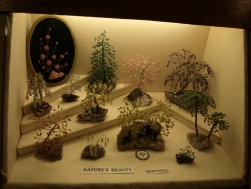
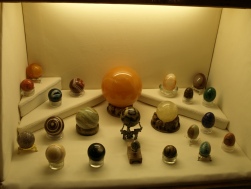
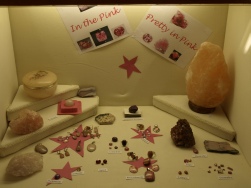
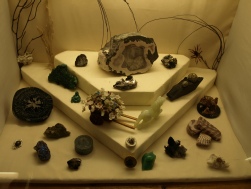
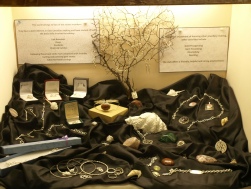
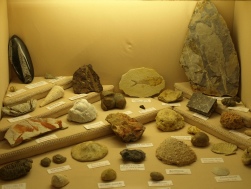
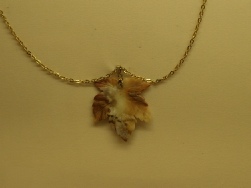
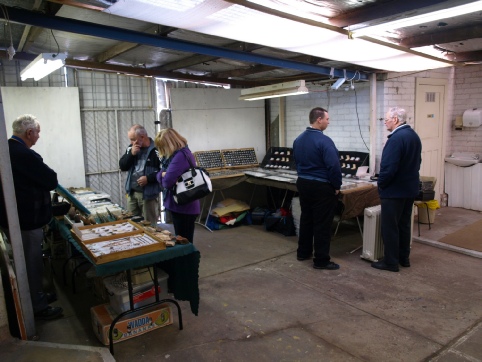
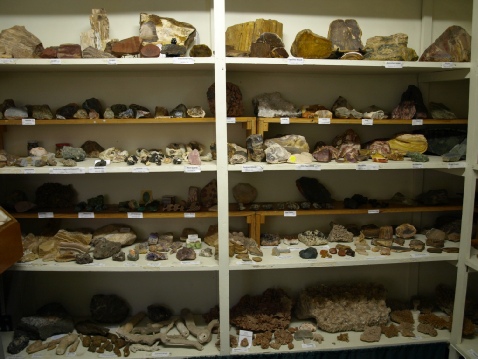
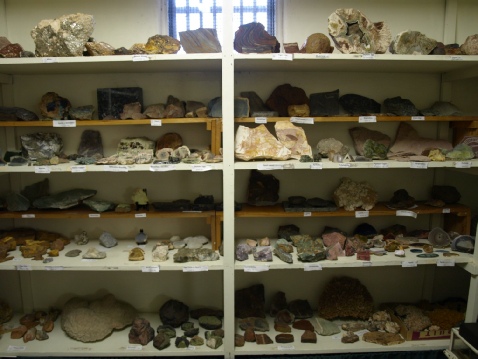
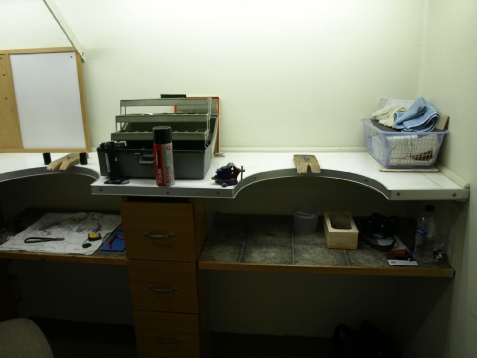
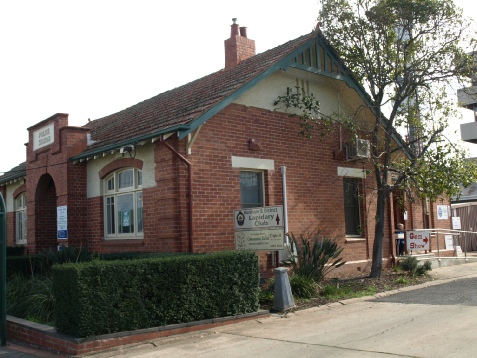
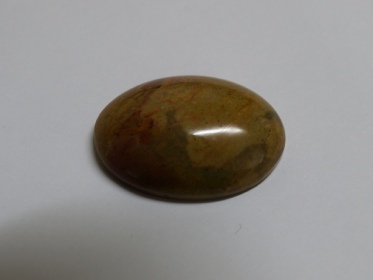
JULY: While travelling north I visited Lightning Ridge, the famous opal mining area. Unfortunately my visit was limited by extremely heavy rain which set in a few hours after I arrived. However the photos below give some indication of the unique character of Lightning Ridge!
Above: warning signs for unwary tourists
Below: typical landscape!
Above & below: ‘housing options’
Below: some photos of the Lunatic Hill Open Cut, the largest open cut opal mine in N.S.W.
Below: Local transport options?
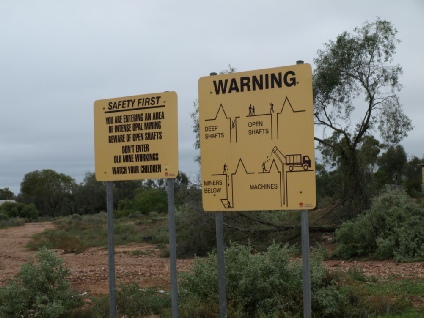
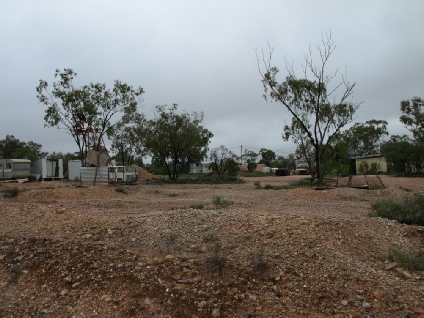
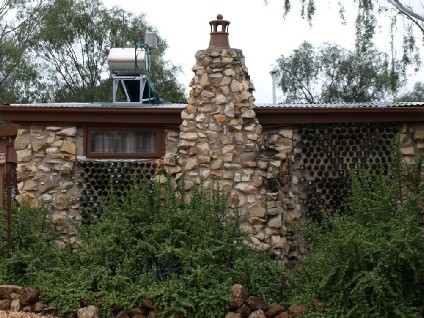
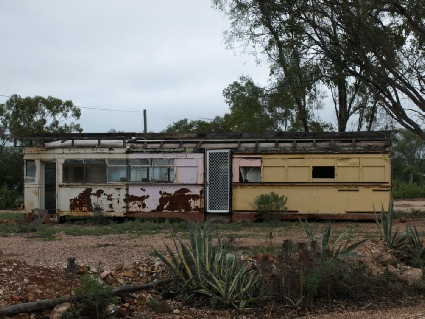
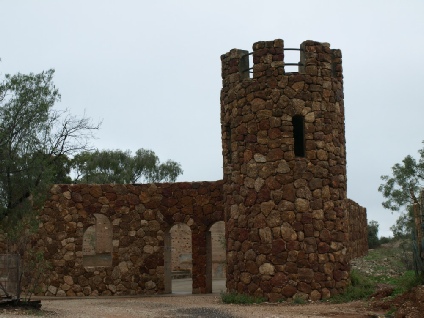
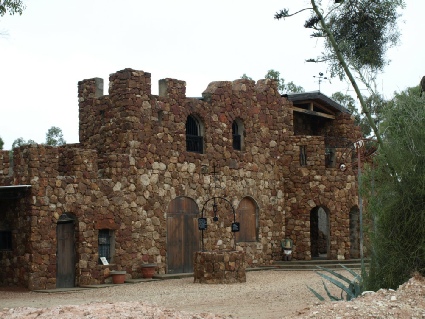
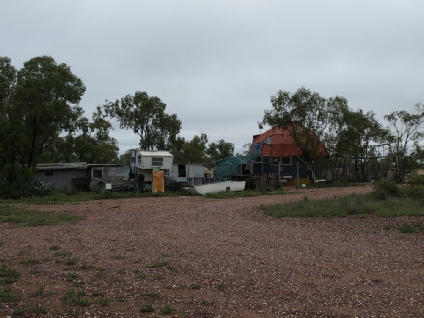
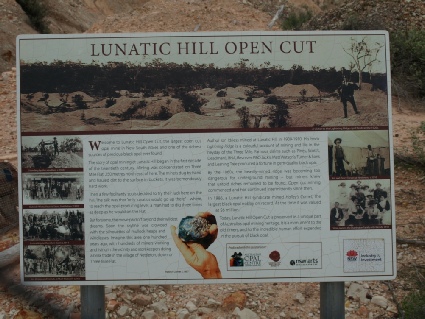
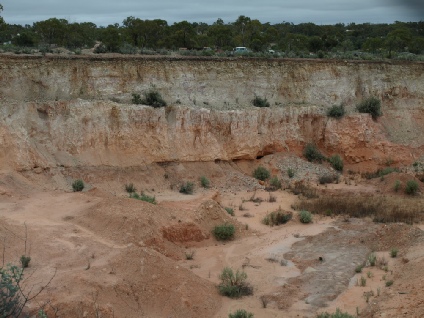
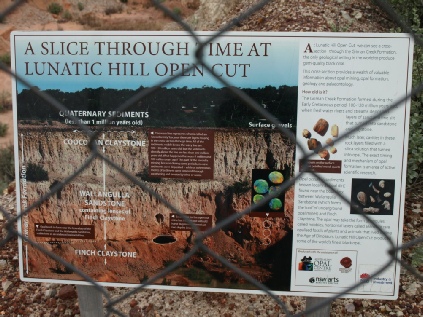
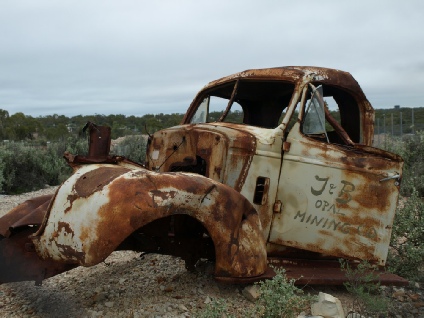
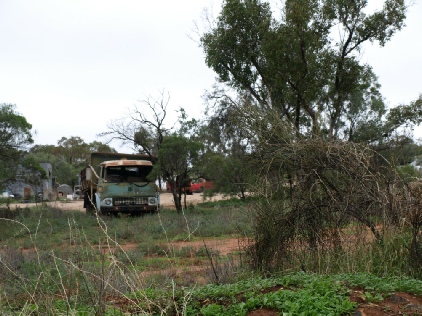
During July I had the opportunity to visit the Mackay Gem Club rooms/workshop. Like all Gem Clubs I have visited they were most welcoming and helpful. They have great clubrooms with an extensive range of equipment which was being well used when I visited.
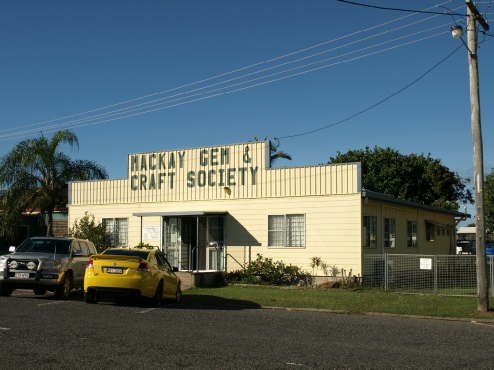
External view of the Mackay club’s rooms.
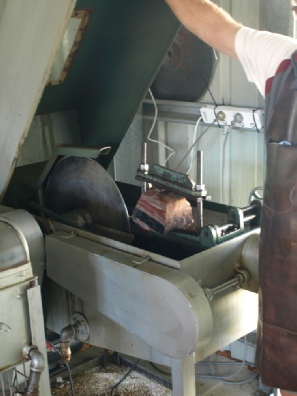
They had a good range of slab saws.
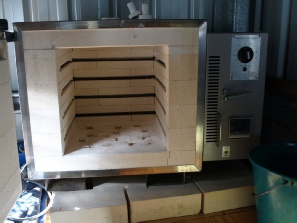
The club had electric kiln’s!
And flat laps.
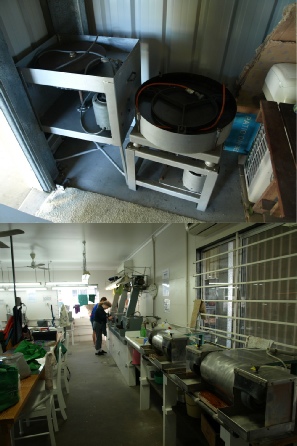
Club members had access to a large well equipped cabbing area.
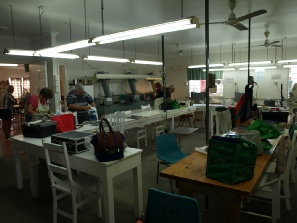
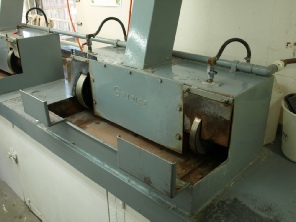
The workshop is well lit and spacious.
Most of the cabbing, sanding and polishing machines were constructed by local members and are made of stainless steel. The grinding wheels are diamond plated or sintered.
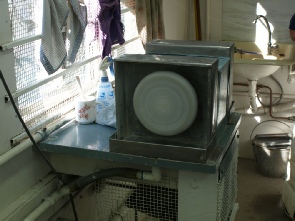
Polishing buffs.
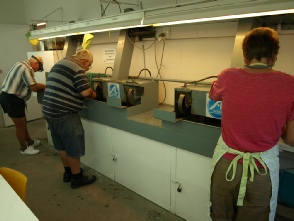
Club members at work. Good overhead lightning!
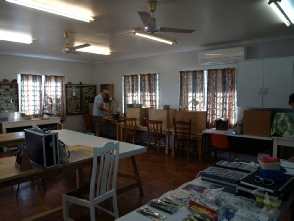
General purpose room with faceting machines in background.
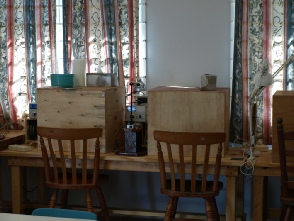
VJ faceting machines.
A few days later I briefly visited the Rockhampton Gem Club rooms. They also have excellent facilities, partially as a result of the considerable government financial support available to community club’s in Queensland (from gambling funds).
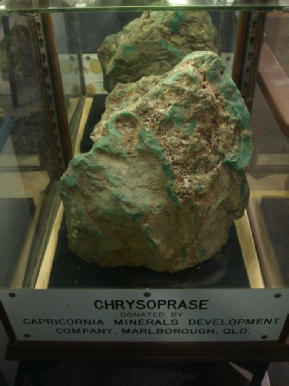
A massive specimen of chrysoprase on display at the club.
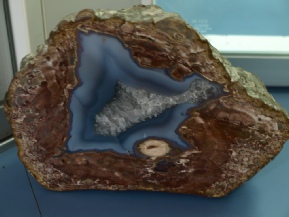
A Queensland agate in the club’s display!
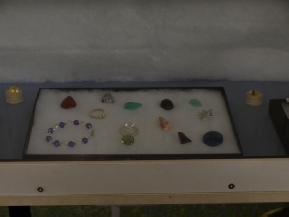
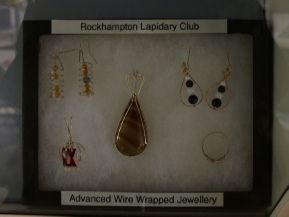
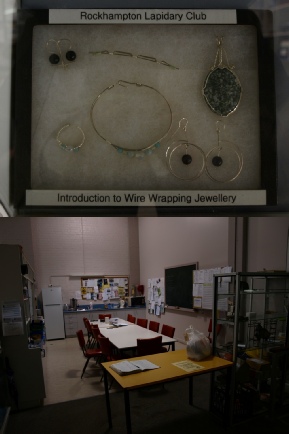
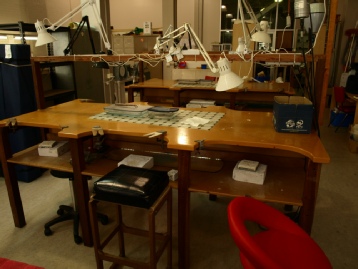
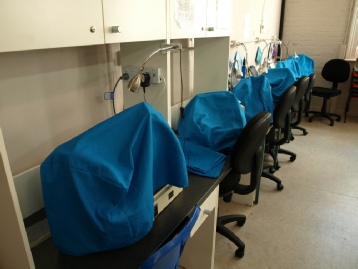
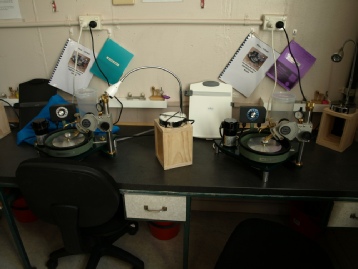
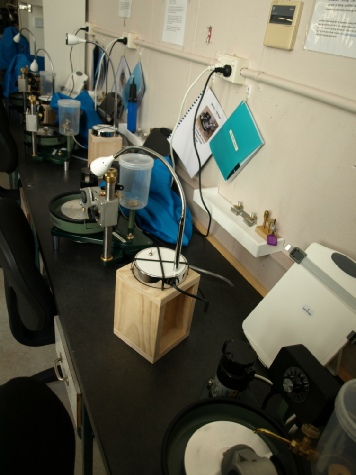
A display showing members what is involved in the ‘advanced wire wrapping course’
A display showing new members some of the lapidary work they can aspire to. A good idea!
Tasks involved in the introductory wire wrapping course.
Club meals area.
Silversmithing benches.
The Rockhampton club recently installed 6 new faceting machines with new chairs, a new bench and lightning.
The faceting machines are all ‘Hall-
The club received a government grant to assist in purchasing the new faceting machines.
A great asset for any gem club!
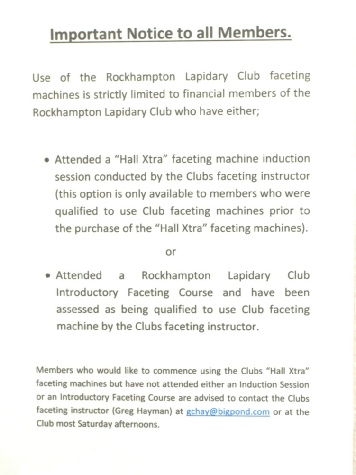
The club has a sound policy to ensure that members using the faceting machines are competent. A good approach given the enormous financial investment involved in purchasing such equipment.
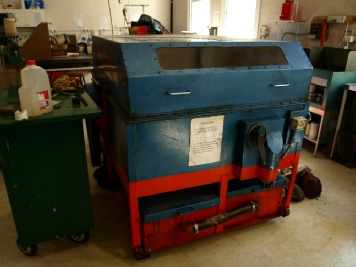
The club’s ‘big bertha’ slab saw for those really big rocks!
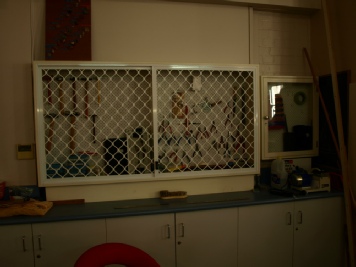
Silversmithing equipment is kept secure and easy to find!
July 9 The Hervey Bay Gem Club held it’s annual show on the 9th and 10th of July. The weather was lovely and a big crowd was in attendance while I was there. The photos below give a flavour of the show. The club deserves to be commended on the quality of its show.
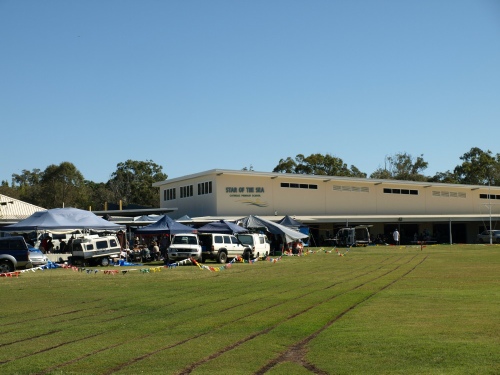
The show was held at the Star of the Sea school.
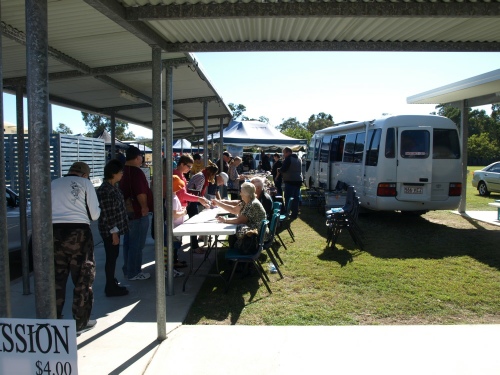
Entry to the show, under a clear blue sky.
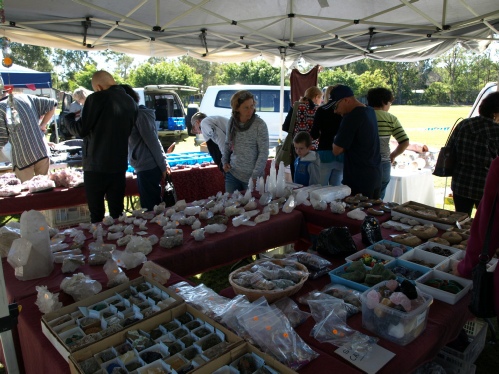
Part of the outdoor trading area.
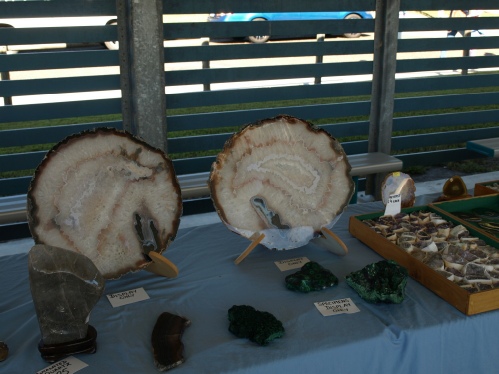
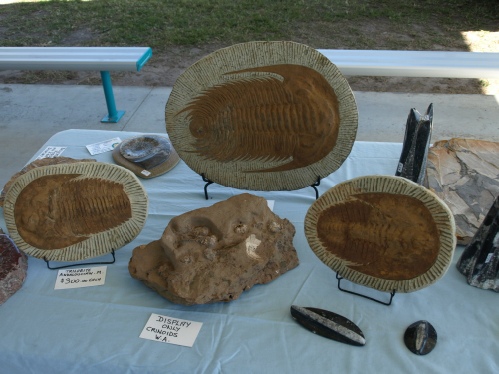
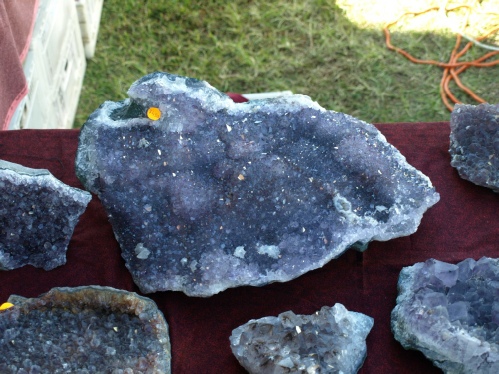
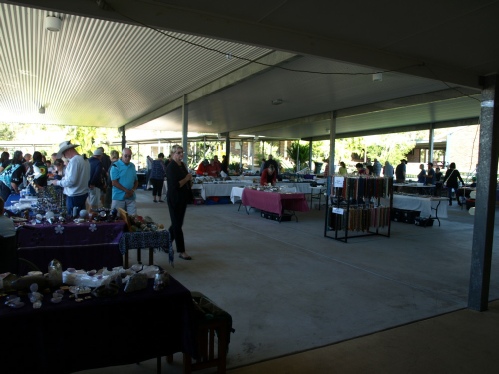
Beside & below: some of the items for sale in the outdoor areas.
Another outdoor trading area at the show.
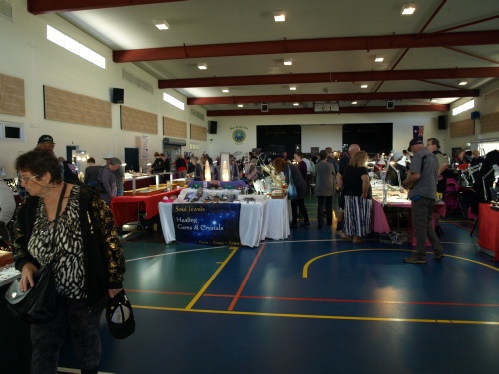
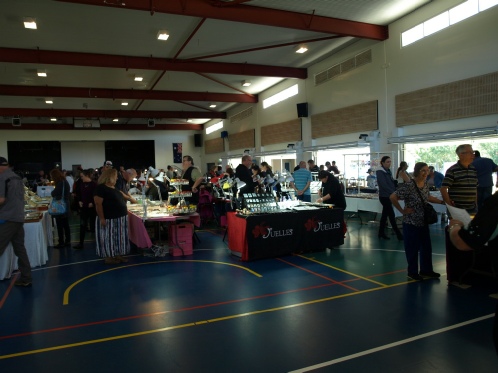
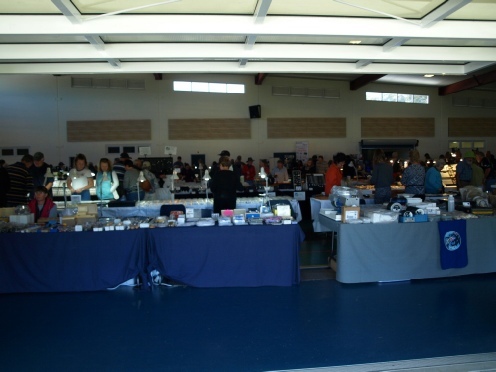
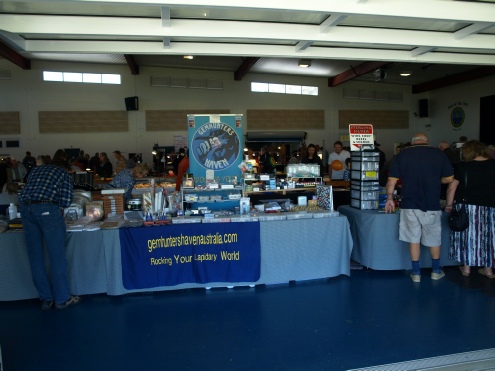
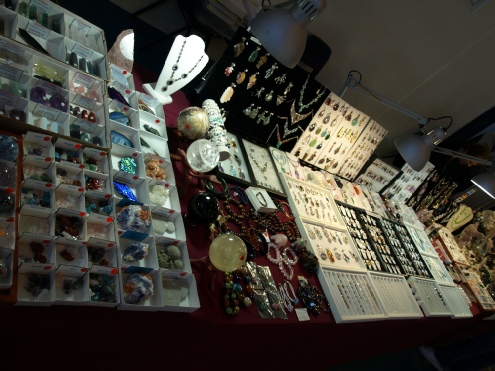
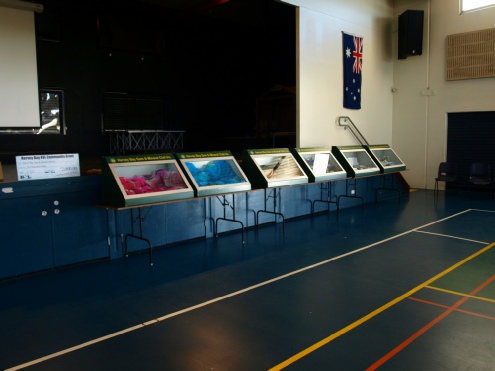
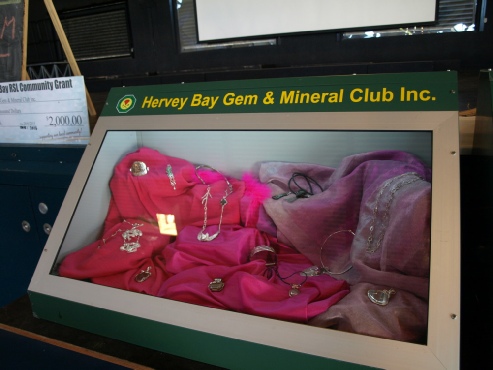
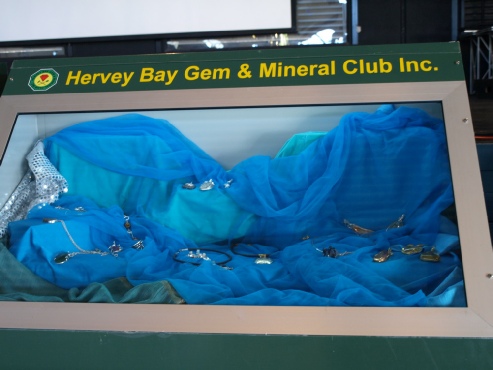
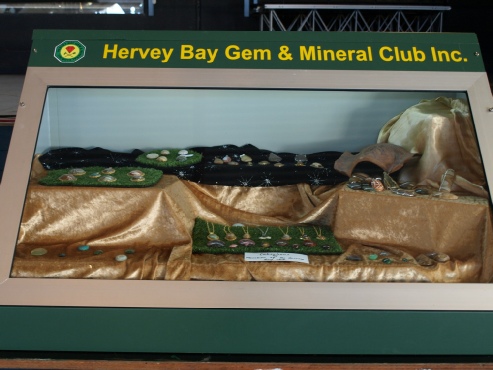
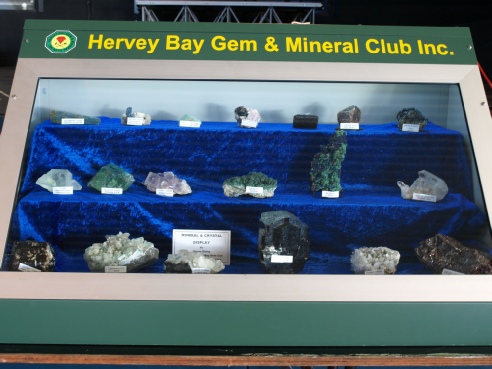
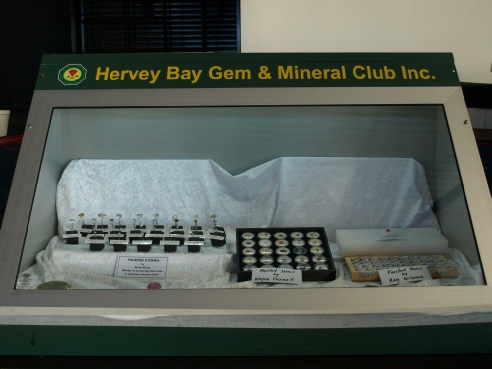
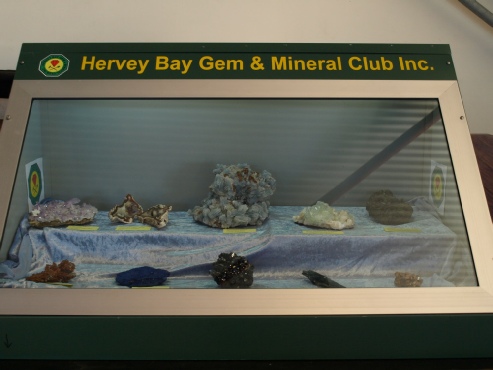
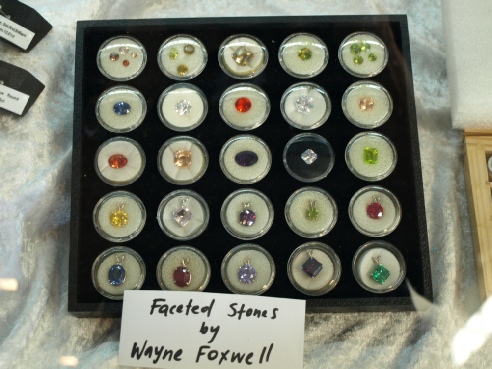
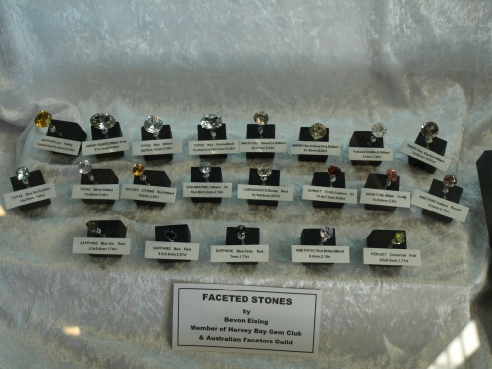
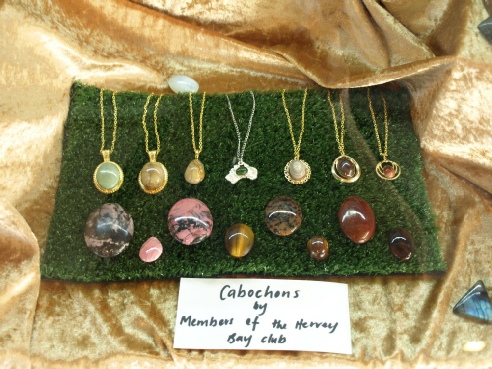
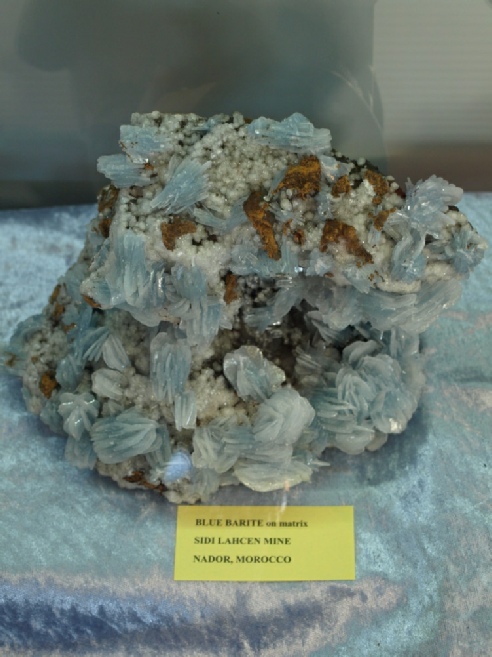
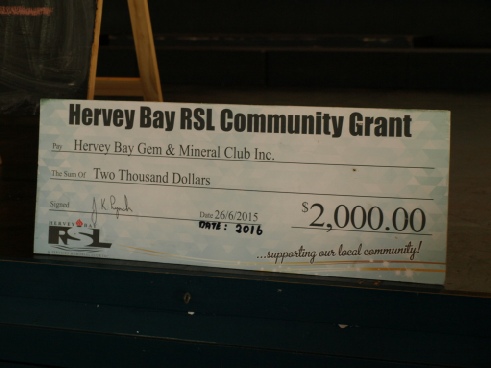
Four photos of the show inside the main hall. A good range of traders and a large number of members of the public.
One of the trade stalls in the main hall.
The club had six display cases showing members work & collections
Four photos showing some of the content of the display cases. Some lovely examples of faceting and cabbing work plus a beautiful specimen of blue barite.
The club is obviously well supported locally!
AUGUST Good to see a few more members making use of the club rooms. The silversmithing and faceting areas are getting good use and thanks must go to John H. for guiding our new facetors; and to Anthony M. for running the silversmithing area.
The club was grateful to receive some rocks from the collection of Roland Goldstraw (dec.), who was a member of the club in the late 60’s and early 70’s. The stones will add to the clubs stock of cabbing rough.
Sat. 13th. Club members (Kay K., Janice & Keith F., Alan A., Helen, Diane, Diana, Robert, Anthony, Rod) spent the day manning the BBQ at Bunnings as a fund raiser for the club. Typical August day with sunshine, rain and wind but we sold a lot of sausages!
Thanks must go to all the members who participated, especially Kay who does the organisation. It is a great way for community groups to raise funds and Bunnings deserve credit for enabling these events.
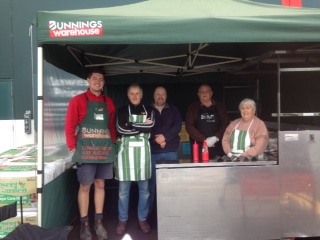
Bunnings member, Alan, Anthony, Rod, Kay
Sat. 20th Eight members of the Warrnambool Gem Club visited the Ballarat Gem Club Show in Invermay Park. There was a good crowd moving around the show with many people making purchases. Our club members took the opportunity to obtain cutting materials, grits, polish and tools. A few photos below give some flavour of the show.
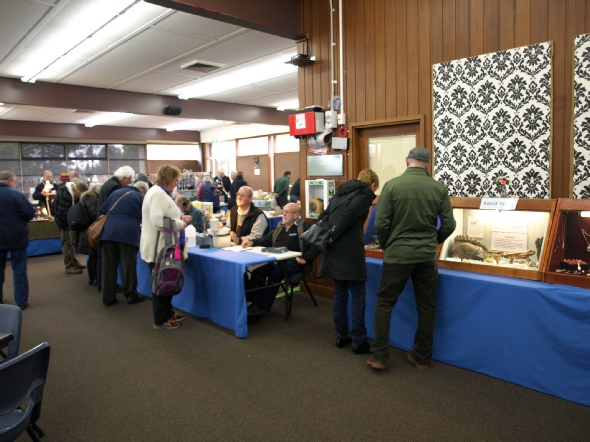 Above: entry to the show with display cases on the right.
Above: entry to the show with display cases on the right.
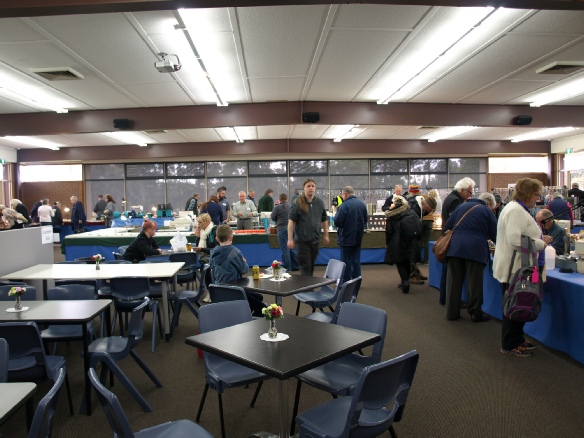 Above: dining area in foreground with main show area in background.
Above: dining area in foreground with main show area in background.
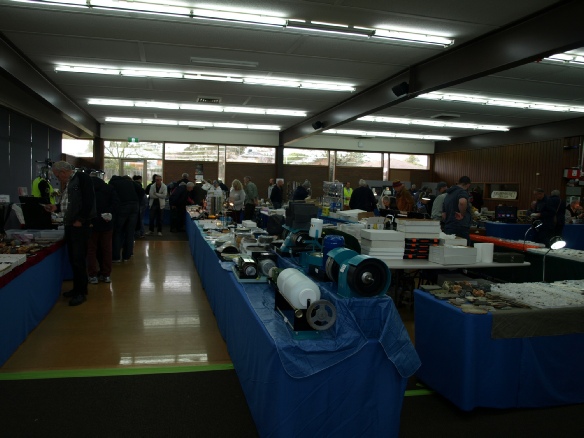 Above: view of some of the trading area.
Above: view of some of the trading area.
Below: some of the visitors to the show.
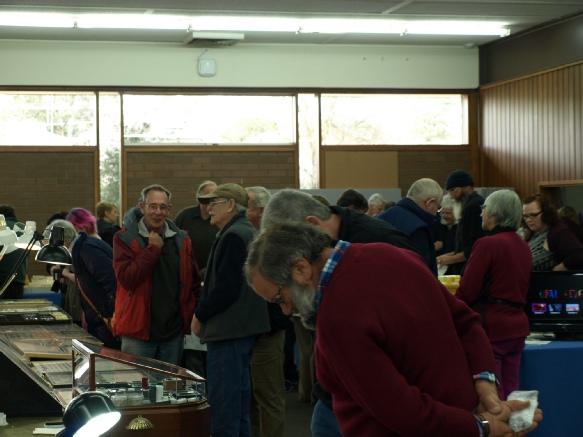
September 15/9 The club is pleased to announce that we have received a grant from the Warrnambool City council to help us purchase a new ‘Hall Xtra faceting machine’. The council grant provides 2/3 of the cost of the new unit and means we will now have two ‘near new’ faceting machines as well as the two ‘ancient’ machines we have been using. This will greatly assist in our teaching of the faceting art to new and current members. Club members are most appreciative of the council’s ongoing support for our club.
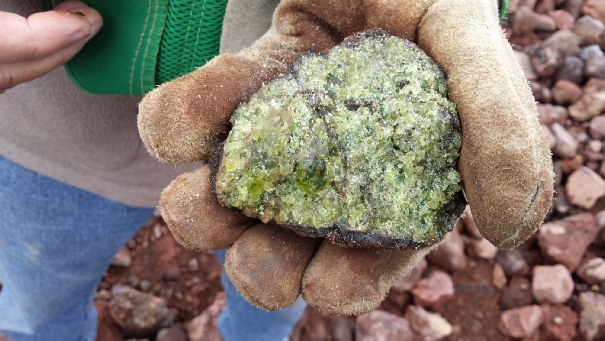
Woody’s first bomb showing the ‘gemmy’ part near the bottom.
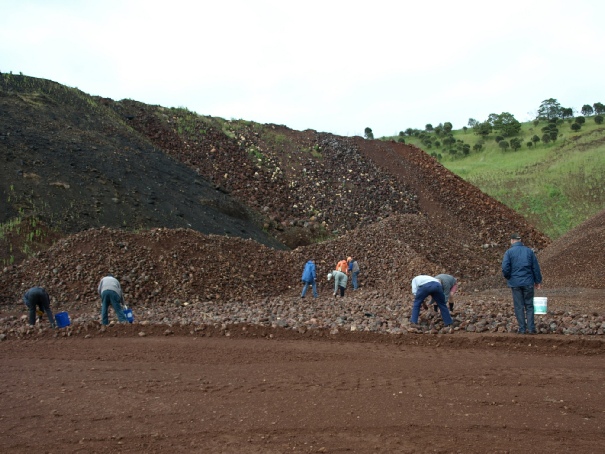
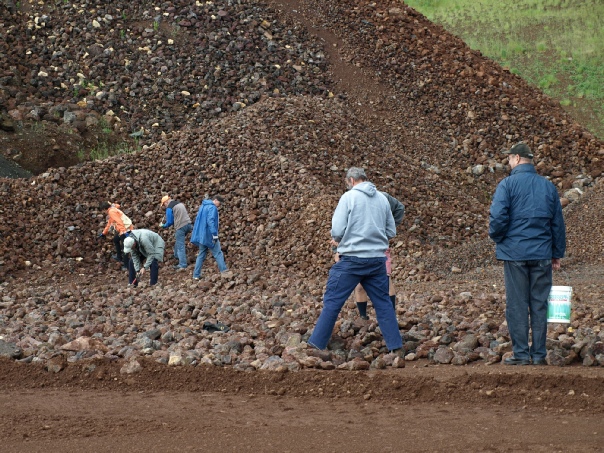
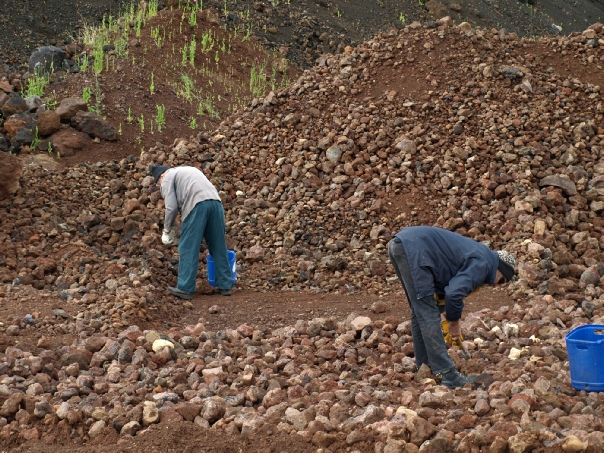
Above three photos show members fossicking in the ‘bomb’ heaps which are sieved out from the commercially used scoria.
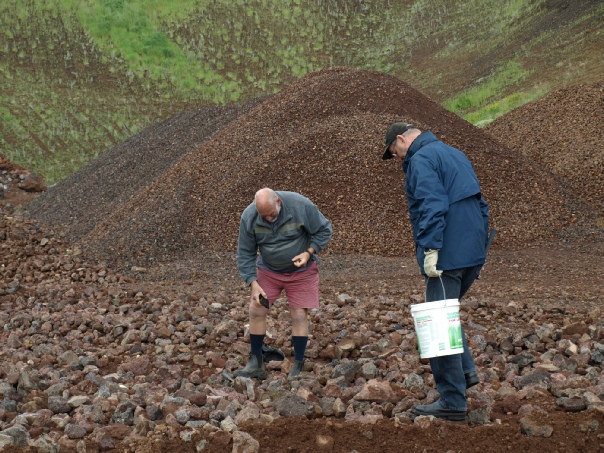
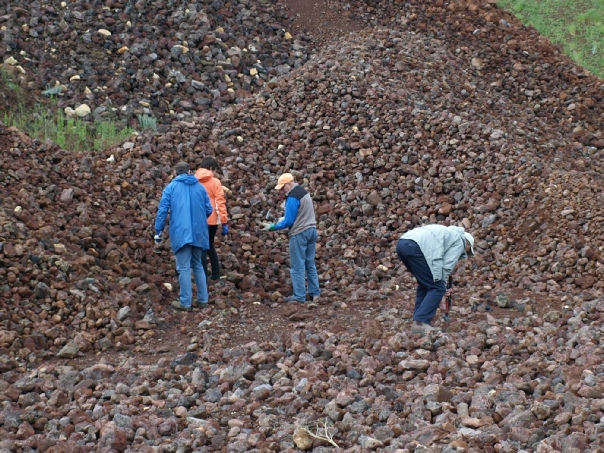
John Chivers (L) searching for ‘volcanic bombs’.
Alan Wood centre, breaking open a volcanic bomb.
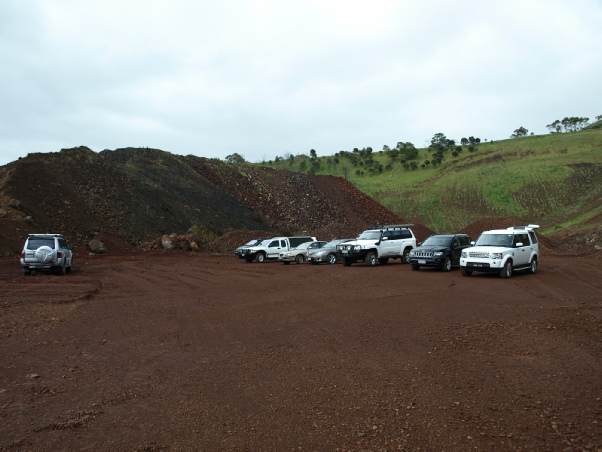
Some of the vehicles parked at the quarry.
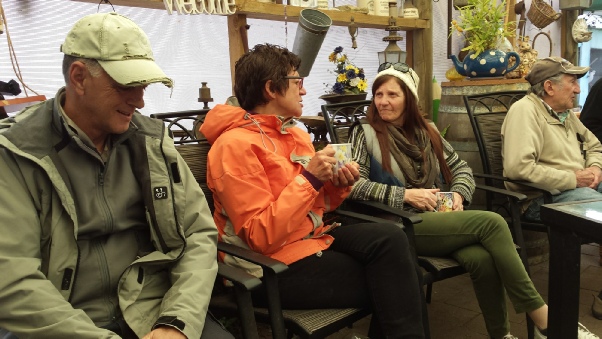
Jeff & Linda (left) at the bbq.
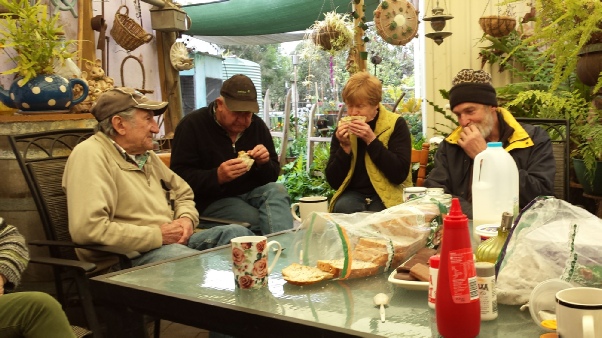
Getting stuck into lunch.
November: Thursday 3/11/16 Alan Altmann and Alan Wood visited the Koroit Primary School for a ‘show and tell’ with class 3 and 4 students. Alan Wood explained the history of Mt Shadwell, volcanic ‘bombs’ and the olivine found there. He showed some of his lovely faceted ‘peridot’ and some olivine cabachons. Alan Altmann showed the varieties of quartz including amethyst, smokey and citrine. Faceted quartz, tumbled and carved agates and some fossils were also handed around. The students were enthusiastic and enjoyed the sessions as did the two Alans.
6/11/16 Eight club members attended the Geelong Gem show on Sunday. We had a good drive down and it was great to catch up with many of the lapidary community from Geelong and Melbourne. Members took the chance to stock up on grits, tools, faceting rough and some cabbing material.
Cor Melis had a win in the spot raffle and we had a good lunch and chat with Geelong members. The quality of the competition show cases was impressive with some lovely work being done by the Geelong club members. Well worth a look.
October: 23/11 Members from the Warrnambool, Geelong and Ballarat clubs met at the Mt Shadwell quarry for a mornings fossicking. Despite a poor weather forcast, conditions were good. Overcast but not windy or cold. Some 14 members met Rod Steffenson and Alan Wood at the quarry and quickly got down to the business of searching for the ‘good volcanic bombs’ that could contain gem grade olivine. Alan Wood found two good bombs and I understand a visiting club member also found a ‘gemmy bomb’. After three hours at the quarry we went down to Alan Wood’s home for a nice bbq and chat plus a look at his collection. All up a good day.
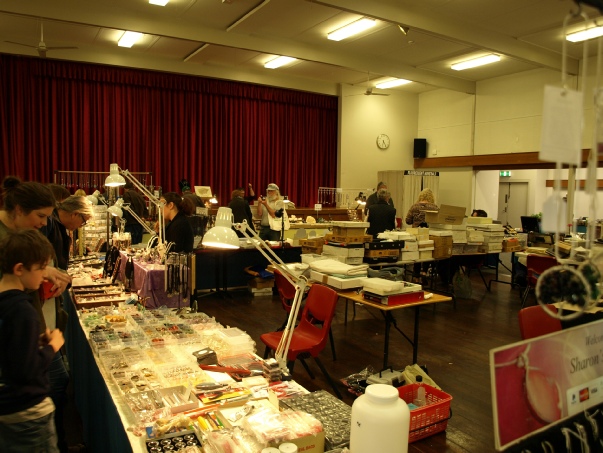
Above and below: general views of the show.
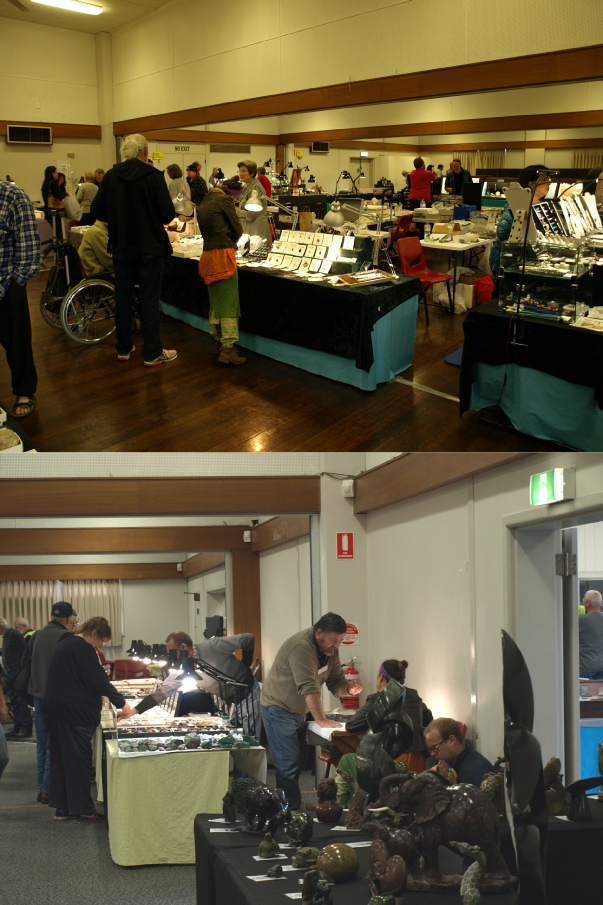
Above: foreground: carvings, background: Dianne and Steve sorting out faceting rough. Below: a great carving of a frog
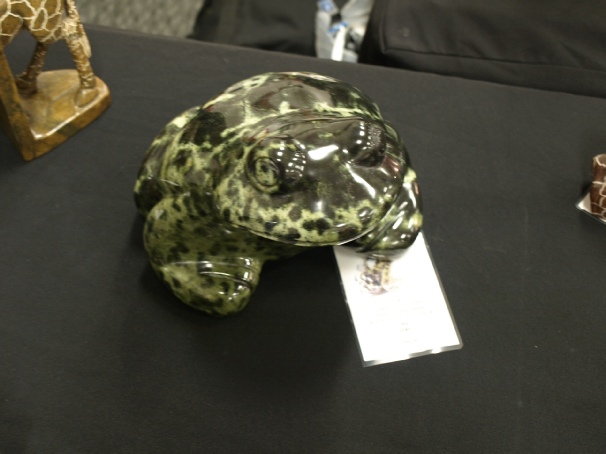
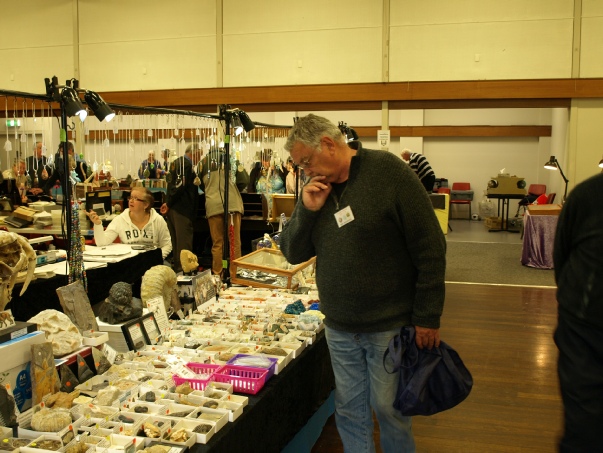
Above: Rod perusing some fossils. Below: some of the quality items on sale on the Geelong club stall
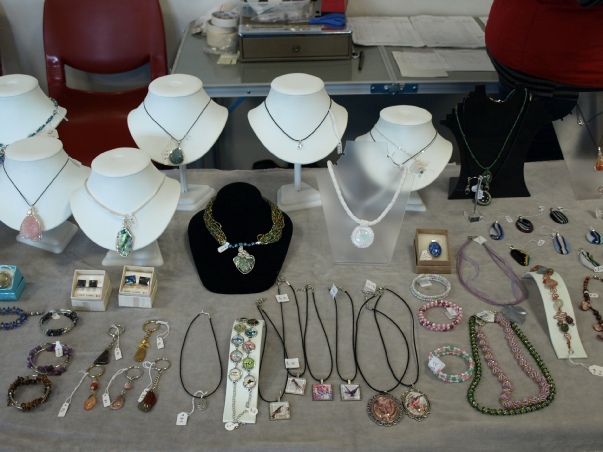
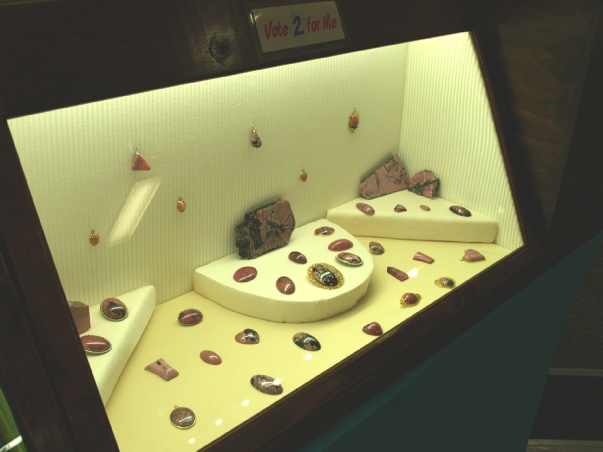
Above: a display case of good quality rhodonite cabachons
Below: some great fossils from the Batesford quarry.
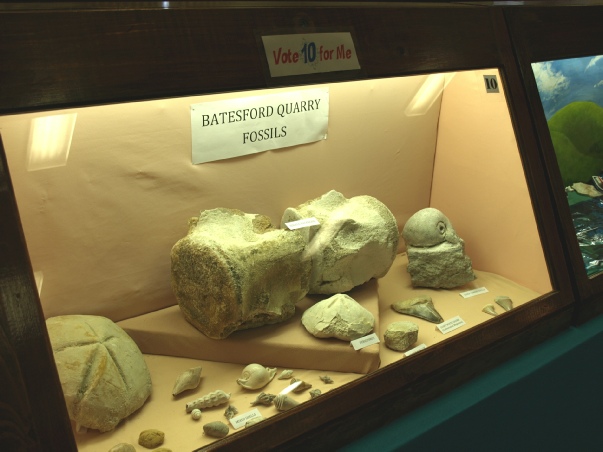
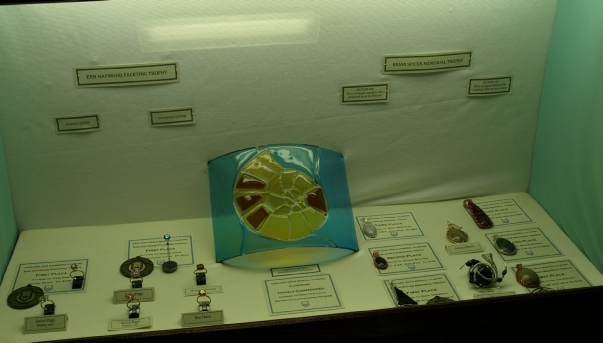
Above: competition faceted gems and wire-
Below: cabachons and hand fabricated jewellery.
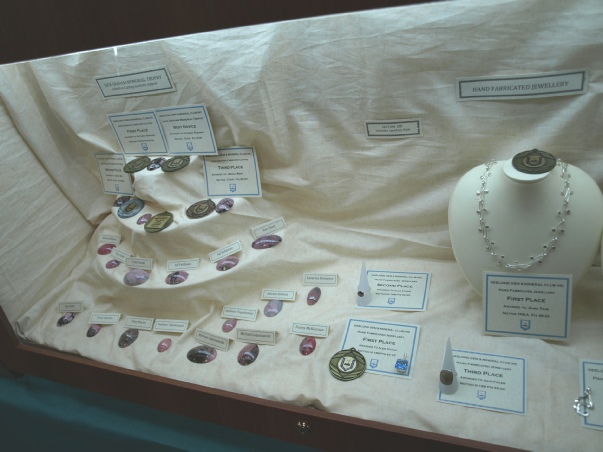
Kay and Steve sorting out some faceting rough for Kay.
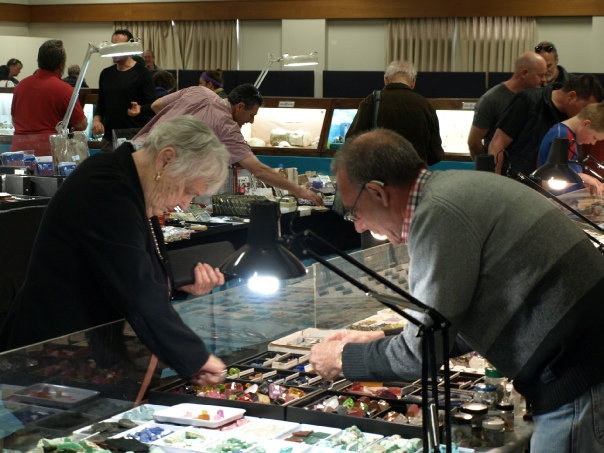
Cor Melis: It is with regret that the club has to announce the passing of long term club member Cor Melis on Friday, 11/11/16. Cor was with club members at the Geelong show only last weekend and was organising a visit by the club to the gem/mineral display in Portland (which he was instrumental in establishing) early next year. He had recently donated a collection of gem magazines, from the USA, to the club library.
Cor had fossicked extensively around Australia and had cut/cabbed/tumbled agates, topaz, sapphires etc over many years as a lapidary. He was active till the end, suffering a stroke on the Thursday before passing on the Friday at the age of 97.
He will be missed by all who knew him.
17/11 Club members Alan A., Kay K., Janice F., Helen B. and Robert H. attended the funeral of Cor Melis at the Catholic Church in Portland. The church was packed with the many members of the Portland community whom Cor had known over the years.
A few facts about Cor Melis.
He was born in February 1919 in Eindhoven, a city in the south of Holland. After finishing high school he entered the textile industry, and later studied chemistry.
Early in 1939, when war in Europe appeared to be a distinct possibility, he was called up into the Dutch army at the age of 20, and after training, served in the 2nd Cavalry Regiment. This was a motorised unit equipped with modern anti-
On the 10th of May 1940, Germany invaded Holland without warning, and for the next few days, he and his gun crew were continuously in action in the south-
After Holland capitulated, he was made a prisoner of war pending the disbanding of the Dutch army. On being discharged, he returned home and took up his former occupation as a textile worker and industrial chemist. However, like many young people in occupied Holland, he was eventually sent to Germany in November 1942 as a forced labourer and put to work in the oil industry as an analytical chemist.
He was initially stationed near Hanover, but a year later in November 1943 he was sent to an oil field in Austria close to the Czechoslovakian border where his job was to analyse oil samples taken from the drill field. He was still there in late 1944 when the Germans were forced to retreat ahead of the advancing Russian army. Left to his own devices when the Germans abandoned the oil field, he attempted to return home but was caught up in the front line fighting. He was arrested by the Russians who suspected him of being an escaping enemy soldier disguised as a civilian, and it was only by nervously singing the Dutch national anthem that he was able to convince the Russian interrogator that he was on their side, and so escape a firing squad.
When the war finally ended in 1945, he was simply one of millions of displaced persons left stranded throughout Europe. Over the following months, he made his way to the west on foot, jumping trains, and travelling by any means possible. He finally returned home in mid-
In 1947 he married Nelly, and in 1950 they decided to leave Holland and make their home in Australia, because it offered a much better future than post-
Because of his chemical engineering background, he was offered the job of completing the partially constructed cement works in Port Fairy, and so became the Works Manager. He later resigned and took up a position at Glaxo Allenbury as head of the fermentation division manufacturing penicillin.
In the meantime he had developed a keen interest in photography, and joined the Warrnambool Camera Club. In 1963 he was offered the opportunity to take over a photographic business in Portland at 11 Julia St which he operated till 1982.
In 1966 Cor was invited to join Rotary, an organisation with which he was associated for the rest of his life. He was also a Life Member of the Portland Camera Club.
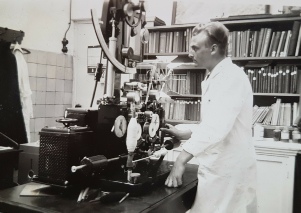
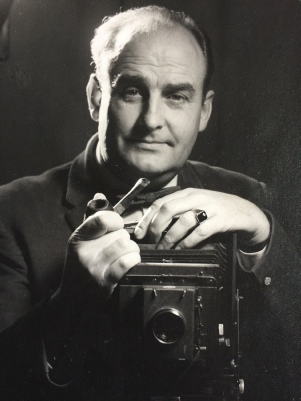
Above: Cor Melis the industrial chemist.
Right: Cor Melis the photographer.
Nellie and Cor sold the photography shop and retired in 1982, and then began a second career as enthusiastic gem diggers and collectors. It was a great partnership. Cor found, cut and polished the stones, and Nellie picked out the best ones and kept those for herself. Somehow, they both seemed to be happy with this arrangement. They also particularly enjoyed attending the various markets displaying and selling their stones and gems.
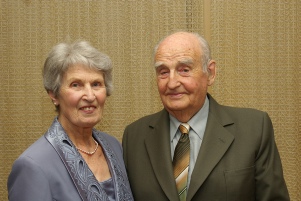
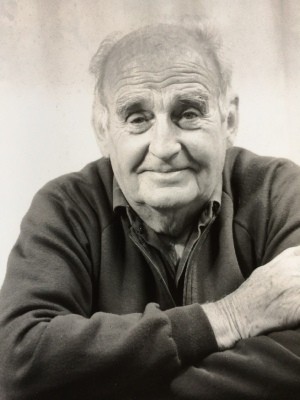
Above: Nellie and Cor.
Right: Cor Melis.
Steve Morgan (below), with help from other club members, produced this ‘Gem Shield’ for use by the Warrnambool Hospital. It contains petrified wood, Moonlight Head agates and Mortlake Peridot on a timber base. It will be used in competitions between units in the hospital. A great effort by Steve.
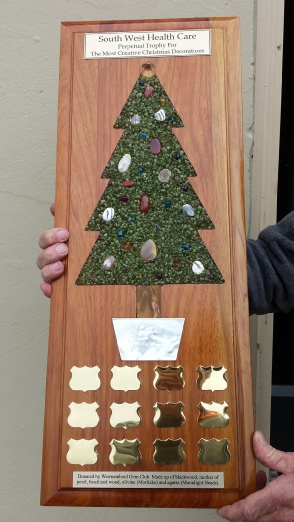
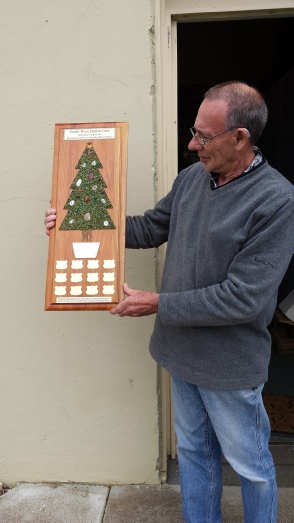
December
8/12/16 Club members Alan A., Janice F., John H., Gillian H., Steve H. and Siobhan V. ran pendant making and ‘pet rock’ making activities at the Bunning’s family Christmas night. We were all ‘flat out’ for the two hours as many children took part in the activities. Members enjoyed the evening and the enthusiasm shown by the children.
